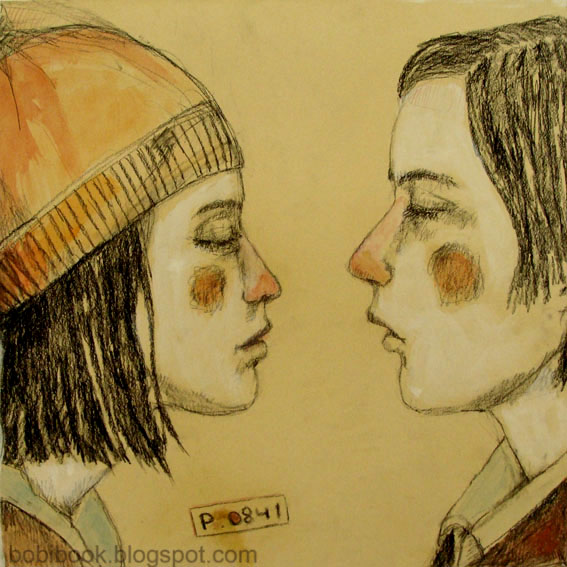
Depression is an asshole.
Depression is a heavy, moth-eaten wool sweater that smells like a wet dog, that you are forced to wear on humid summer days. Depression is a ruthless cold hand slowly squeezing your heart. Depression is the worst roommate you ever had in your 20s, who never cleaned the bathroom, always messed up the microwave with tomato sauce and melted cheese, and loved telling you all that was wrong with her life, sitting too close to you, halitosis wafting, while you were just trying to quietly read a really good book.
I am not trying to sugarcoat it: depression is the worst.
I know what I speak of; I have been moderately depressed most of my life. My grandfather and brother took their lives, my mother had bipolar disorder, and several aunts and uncles have been hospitalized due to the Black Dog, as William Styron named it. However, I would rename it Beezelbub, since it feels like a dark spirit possessing you, telling you you are utterly alone and unable to be understood by anyone but it. I am a mental health advocate and have counseled clients with depression for years. I see how it slowly shreds lives into pieces; how it grinds people down to the smallest parts of themselves until that’s all they can see.
Suicide, of course, is the tragic climax for those who suffer without hope. According to the WHO, a suicide is completed every 40 seconds, and for every “successful” suicide 20 other attempts are made. Yet, the cliché of suicide being a permanent solution to a temporary problem is often true.
In the 2003 The New Yorker article “Jumpers,” almost every person interviewed who had jumped off the Golden Gate Bridge but not died said they regretted it as soon as they were in the air. One jumper stated, “I instantly realized that everything in my life that I’d thought was unfixable was totally fixable—except for having just jumped.”
Hopefully, for most of us with some form of depression, we are not wanting to end things, even if sometimes we feel like we might not want to wake up. Yet, if you are prone to depression, it can sometimes be a lifelong companion. No antidepressants ever worked for me, at all, and I have continued to manage by knowing my triggers and knowing what helps keep me above the waves and out of the riptides that could pull me under. Because my dysthymia (moderate depression that is consistent) does feel like a part of my life I may never fully shake, I have done my best to accept it and make the best of it. I have even decided to see benefits in depression because I like to believe that everything can be nourishing if we choose for it to be. Even if this nourishment sometimes tastes like liver and onions washed down with possibly expired milk.
Depression creates more soul
Soul. What does this mean when we say someone or something has “soul?”
Usually, it means that the person has suffered in some way, has been broken, cracked, penetrated, and deflated by life circumstances. Through these experiences, the person has developed a more complex persona, a more nuanced perspective on life and themselves, perhaps a more unique and weathered way of expressing themselves. Their soul has Wabi Sabi. Like a rusting tractor in a field or an old barn with faded paint, their experience has given them a beautiful, singular character that a shiny new tractor cannot match.
Britney Spears in her 1999 Catholic school girl video prime may have been alluring, but 2021-Britney has been down some rough paths, been humbled and lost and treated poorly, has seen how the world eventually turns on what it formerly adored. I would much rather have dinner with 2021-Britney than “…Baby One More Time” Britney because I bet she is far more interesting and able to have a connective conversation.
I have wanted to be a writer since I was a child, and always had some talent (he says modestly). However, my writing did not have much gravitas or complexity until after I had gone through the emotional aftermath of my brother’s suicide and taken the journey of anger, confusion, and spiritual shedding and transformation. On this road less traveled, I found many answers I had been looking for, about why we are here and what we are doing. I was able to focus more on what mattered to me, and what I wanted to leave behind. I knew myself better, and had looked, sat with, and made some peace with The Void. My suffering, whether I consciously wanted it to or not, had given me more soul.
It makes you kinder
Unless it doesn’t. Some sad people are Angry Sad, or Caustic Sad, or Apathetic Sad. I’m living in my own private tragic movie—they seem to convey—so you should be too. Join me in my misery. Or, their pain has turned them hard, and lost in their own experience, unable to see out clearly from their cloudy fishbowl of suffering.
However, for those of us who don’t want to get stuck in our own pigpen of despair, we know how deep melancholia feels, and we don’t want to see others under their own bell jars. We want to free them. We want to let them know they are not alone. We want to be the wounded healer. We want to connect and empathize and share and hug and cry and listen with others.
Happiness is wonderful, of course, but also sort of vapid. When we are filled with joy, or on a tropical vacation, or eating ice cream and watching our favorite movie, we are pretty unconscious of the big picture of life. We are blissfully self-absorbed, and all the suffering people in the world, all those tragic stories in our news feed, seem far away and other—we are in our bubble of 1950s obliviousness in our own little Pleasantville. Sadness is grounding. If, like me, you spend a good percentage of your life experiencing some level of melancholy, you develop a sort of sixth sense for the river of sadness running through the world at all times.
Even as you smile in the sun, you know this River Styx flows beneath your feet, underground, ever murmuring. You know that in the city of Philadelphia where you live a comfortable middle-class life, just a few miles away the ravages of poverty continue, and all the middle-class lives near you percolate with their own human disappointments and disasters. It makes you want to be kind to everyone because you know everyone is suffering in their own way, as much as their mask of normalcy may disguise it.
You appreciate happiness more
When depression lifts, you feel as if that heavy wool sweater smelling of dog has fallen to the floor, and you have walked out into a beautiful summer night in your favorite soft T-shirt, to hear the crickets and smell the sun-warmed flowers. You feel as if you have been subsisting on ramen noodles for a week because you just didn’t care, and suddenly you are ravenous and are sitting before a plate overflowing with your favorite foods. Music sounds sweeter—although maybe not The Smiths—they sound better when you’re miserable. You have been looking down at your own navel in a haze of ennui, and now you are striding through the world appreciating beauty, scents, the words of your friends, the way the sun slants differently in September. Your land of Oz has suddenly turned from black and white to color.
A man who has been imprisoned will never take his freedom for granted again—and you do not take happiness, or at least the absence of the wool sweater, for granted either. You suddenly have superpowers—the hyper senses of a wolf hunting for pleasure. You also know that the wool sweater will probably come back, so the feel of the wind on your skin is all the more miraculous. In the meantime, you give a Whitmanesque barbaric yawp over the roofs of the world and howl at the beautiful moon.
Both/And
Recently I have begun to become more aware of living Both/And. I suppose it is a Buddhist concept. Acceptance. Flow. Not judging or tightening one’s focus on one perspective. Seeing the benefits of all experience, and not just waiting until the fun or easy comes around again.
This past August, I was driving with my wife to a town about 30 miles away. It was a Sunday afternoon, and we were going to have some pho and then go to this craft distillery and get a flight of gins and whiskeys. We had had a rough weekend and were doing some hard emotional work together. We seemed distant and unresolved.
I felt that Sunday afternoon feeling I almost always feel—the weekend is waning and freedom is disappearing and I have yet to even begin the next week of work, with all its attendant sobering repetitions and complications. My heart was dense and beating with slow, muffled stoicism. I had several worries percolating in my brain (like most depressives, I am a world-class worrier), and a little bit of body dysmorphia—my body felt like a costume that wasn’t fitting quite properly.
Yet. The waning afternoon was full of late summer charms. The sky was gently overcast and green-hued. The smells of meadows and warm tarmac came in the windows. The branches of trees and bushes were still vivid with the green of August, and waved conspiratorially, almost consciously, with the wind. Something good came on Spotify, maybe that new Arlo Parks album, and I was going to eat delicious food and drink delicious bourbon with the love of my life.
The weekend was not over yet, and we would resolve this communication breakdown just as we had resolved the others, and beneath our current tension, the warm energy of true respect and affection hummed. During our dinner we had some tough conversation, but also illuminating, and despite it taking forever to arrive the pho was pretty good, and I bought a cool old record after and had a nice chat with the store owner, and we had fun people watching, and the flight of liquors was very festive, even though I only took small sips in order to drive safely.
I was happy/sad. I was anxious and alive. I was stuck in my stagnant old body and thoughts, and I was free as a bird to choose how I thought, how I could keep coming back to knowing that I was okay—maybe even, sometimes, spectacular, if only for a minute.
You are not a depressed person. You are a complicated person having some sad thoughts. You just have to leave space for plenty of other thoughts too.
You are more aligned with world reality
My old Social Psych professor once talked about how people who are not depressed are looking at life delusionally. They believe that things will continually get a little better, that a good life is a series of building blocks being placed, leading to ever greater senses of achievement and satisfaction. They are not factoring in the small and large setbacks and illnesses and tragedies that visit us. They are wearing rose-colored glasses and their world is a Monet painting—a little blurry, and full of flowers and scenic bridges.
Happiness is difficult for me to trust. The only place to go is down. I may be flying a little, but I don’t trust my wings to keep flapping. Sadness is an unglamorous flightless thing, but it is comforting in its predictability, how you know you are not going to fall from it—you have already fallen.
Just as the past is comforting because there are no surprises—the pain has already happened—happiness feels precarious and fickle, like the present. Happiness feels like a person you are madly in love with who can hurt you by leaving you, or telling you various detailed ways in which you suck. Sadness, like being single, is often boring and lonely, and sexless, but it is safe. You are a rock, you are an island.
One could argue that depression allows one to see more clearly. In a world in which one child dies from hunger every 10 seconds, perhaps profound sadness is merely a realistic reaction to much of life. The key is not to stay stuck there. But avoiding it is akin to avoiding a full life, a true adult experience of awareness and empathy. There are so many joyful experiences to be had—a children’s birthday party, playing in ocean waves with your dog, having a dinner party with friends (remember dinner parties?)—yet tragic nouns such as rape, murder, war, torture, and child abuse tend to overshadow these happy moments for us armchair philosophers, with their immense power to shock and horrify.
I am certainly not saying that humans shouldn’t be happy, hopefully, most of the time. But depression, or sadness—depression’s less fatal cousin—does seem more aligned with many human experiences, and more respectful to these somber facts.
Perhaps, those who experience depression are often more aligned with their own selves, their emotional and spiritual personas, and how they are reacting to the world around them.
Perhaps, depression is merely a form of strong sensitivity and porousness to experience.
Perhaps, those who rarely or never experience depression are not merely gifted genetically with neurons that fire and connect more efficiently.
Perhaps they are also suppressing their ability to awaken to the shadow sides of life, the yang to the ying. In doing so, they are living less full and authentic lives—they are eating lots of sugar but missing out on the earthy harshness of salt or the grim pucker of sour. They are frequently in the sun but rarely feel the cleansing bath of a good rainstorm on their face.
Depression is an asshole.
But it is also an excellent teacher, who sometimes slaps you in the face to awaken you. A frenemy. Sometimes a friend. It is a natural, organic part of our human experience. Despite thousands of years of evolution, we have not been able to shuck this husk of vulnerability and inefficiency.
Depression seems to serve us no biological purpose—it does not help us be more efficient and productive. Instead, it often forces us to pause, lie on the cold ground, and turn inward, accomplishing nothing visible to the outside world. Yet, inside, if we choose to use our pain to expand, we are visiting new dimensions of cognizance. We are traversing different levels of perception, and observing ourselves in the harsh, honest mirrors of reality. Yet we are also softening, and, quite simply, sampling all of the exotic dishes available in the human banquet of consciousness. Not just liver and onions. Depression is temporary. Wisdom gained, consciousness expanded, is not.


 Share on bsky
Share on bsky
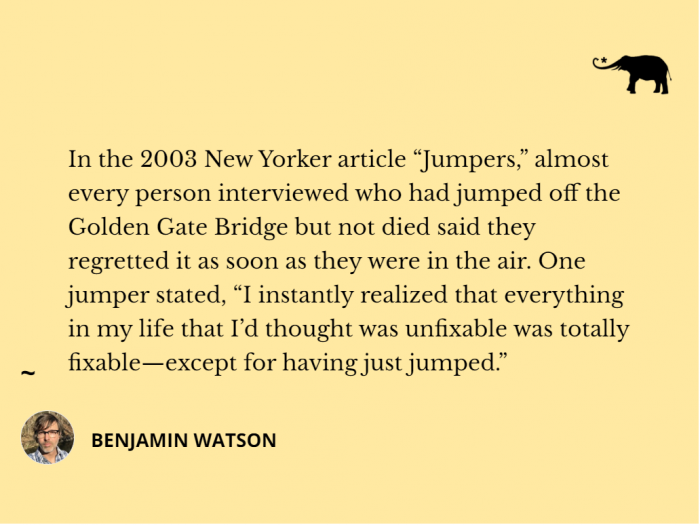
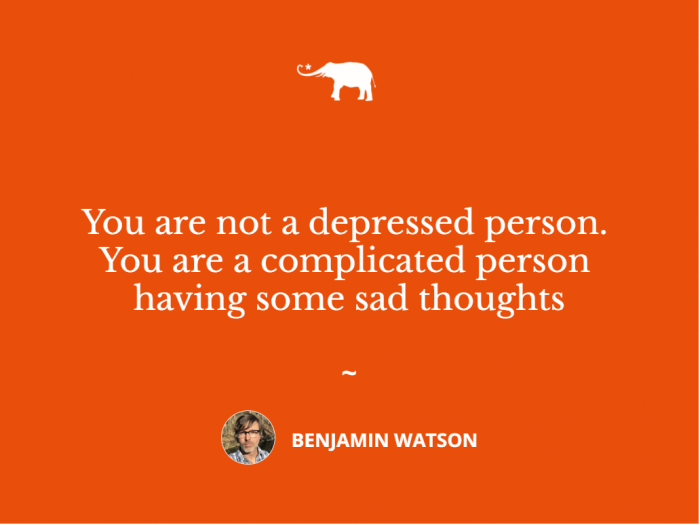
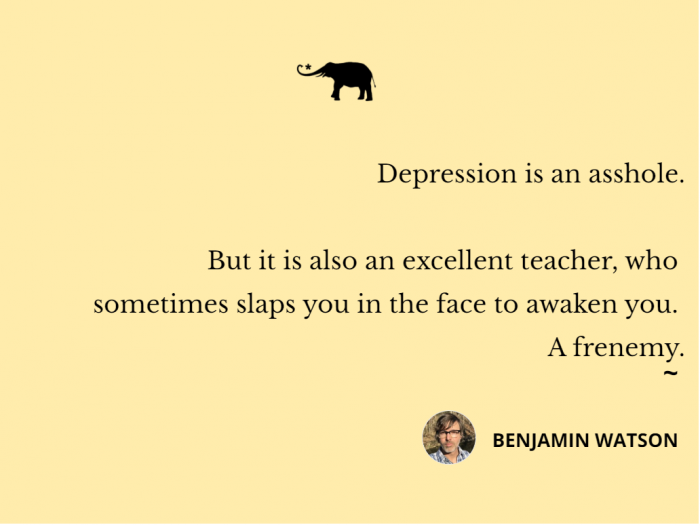
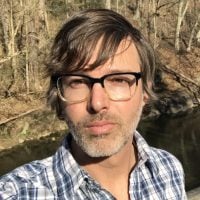



Read 24 comments and reply